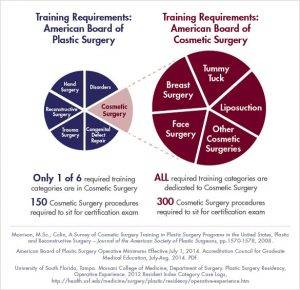
FREQUENTLY ASKED QUESTIONS
Facial Cosmetic Surgery is a multi-disciplinary and comprehensive approach directed to all areas of the head and neck.
The skill Special skill and knowledge are essential and specialists in Facial Cosmetic Surgery are competent in the anatomy, physiology, pathology, and basic sciences. The educational profile of this specialty is unique in that it begins with a fully trained and certified physician. Through continued post-residency education, training, and experience, facial cosmetic surgery is taught and learned across traditional disciplinary boundaries.
Contributing disciplines The subspecialty fully incorporates the participation and knowledge from all contributing disciplines to attain a high level of skill and understanding. Contributing disciplines include facial plastic surgery, general surgery, plastic surgery, otolaryngology, oculoplastic surgery, and oral-maxillofacial surgery.
Expertise Facial Cosmetic Surgeon offers specialized expertise in patient education and counseling, procedural skills, and the early recognition and treatment of complications. As a specialty, Facial Cosmetic Surgeons have enhanced the knowledge and training of fellow physicians and directly benefitted society through educational publications, scientific journals, and the development of safe and innovative techniques. Competency in Facial Cosmetic Surgery implies a combination of knowledge, surgical judgment, technical expertise, and ethics in order to achieve the goal of providing aesthetic improvement.
Cosmetic surgery is a unique discipline of medicine focused on enhancing appearance through surgical and medical techniques. Cosmetic surgery can be performed on all areas of the head and neck. Because treated areas function properly but lack aesthetic appeal, cosmetic surgery is elective. Plastic surgery is defined as a surgical specialty dedicated to the reconstruction of facial and body defects due to birth disorders, trauma, burns, and disease. Plastic surgery is intended to correct dysfunctional areas of the body and is reconstructive in nature. Understanding the difference between cosmetic and plastic surgery is essential. Cosmetic surgery and plastic surgery are not the same things:
- Cosmetic surgery procedures enhance a person’s appearance toward some aesthetic ideal.
- Cosmetic surgery is practiced by doctors from a variety of medical fields including dermatologists, facial plastic surgeons, general surgeons, oral and maxillofacial surgeons, ophthalmologists, otolaryngologists, plastic surgeons, as well as doctors from other fields.
- Unlike cosmetic surgery, plastic surgery focuses on repairing and reconstructing abnormal structures of the body caused by birth defects, developmental abnormalities, trauma, infection, tumors, or disease.
- As cosmetic surgery and plastic surgery, each has distinct practice goals built around a specific procedure set, it only follows that the training and certification process for a board-certified cosmetic surgeon will look very different from that of a board-certified plastic surgeon.

How Facial Cosmetic Surgeons are trained There are currently no residency programs in the United States devoted exclusively to facial cosmetic surgery. Therefore, doctors seeking to learn cosmetic surgery primarily obtain training and experience after completing their residency training in a post-graduate training program called a fellowship. American Board of Cosmetic Surgery (ABCS) accredited fellowships are the only training programs devoted exclusively to cosmetic surgery. Knowing this fact is necessary to understand the difference between cosmetic surgery and plastic surgery. Residency programs in plastic surgery and oral and maxillofacial surgery, ophthalmology, otolaryngology, and general surgery do not include training on every cosmetic procedure.
How to Find a Qualified Facial Cosmetic Surgeon To find the most qualified doctor for a specific facial cosmetic procedure, you must compare doctors’ overall (residency and post-residency) training, experience, and proven competence with respect to that specific facial cosmetic procedure. Know that the residency training required to become board certified in plastic surgery may not include training with respect to many common cosmetic procedures.* Therefore the title board-certified plastic surgeon may indicate certain training and experience with respect to plastic surgery, it does not indicate the same thing with respect to cosmetic surgery, nor does it tell you that the doctor has more or less cosmetic surgery training than a board-certified dermatologist, facial plastic surgeon, general surgeon, gynecologist, oral and maxillofacial surgeon, ophthalmologist, otolaryngologist, or another doctor.
*, SEE MORRISON, M.SC., COLIN, A SURVEY OF COSMETIC SURGERY TRAINING IN PLASTIC SURGERY PROGRAMS IN THE UNITED STATES, PLASTIC AND RECONSTRUCTIVE SURGERY JOURNAL OF THE AMERICAN SOCIETY OF PLASTIC SURGEONS, PP.1570-1578, 2008.
The American Board of Cosmetic Surgery is the only certifying board that exclusively tests a surgeon’s knowledge and experience in cosmetic surgery. This is a board dedicated to the specialty of cosmetic surgery and the patients who choose to have this elective surgery. The American Board of Cosmetic Surgery is designed for extraordinary surgeons that must already possess at least one recognized board certificate before they can even be considered to potentially take the rigorous written and oral exams required by the American Board of Cosmetic Surgery.
Diplomates of the American Board of Cosmetic Surgery demonstrate the highest standards of training, knowledge, and expertise while promoting the safe and ethical practice of the specialty of cosmetic surgery. Many doctors of various competing boards may try to claim superiority for one reason or another over the American Board of Cosmetic Surgery, yet, the truth is, that most cosmetic or plastic surgeons do not qualify to take the ABCS board exam the very strict qualifications they must meet. Because no other board tests an individual exclusively in cosmetic surgery, the American Board of Cosmetic Surgery prides itself as being the highest standard of measure for this specialty.
Note: In the January 1999 medical publication, Clinics in Plastic Surgery, the head of a large California Malpractice Insurance Company, Dr. Mark Gorney, a Board Certified Plastic Surgeon, reported that when Board Certified Plastic Surgeons were compared to Cosmetic Surgeons, Board Certification in Plastic Surgery is not necessarily the hallmark of a claims-free surgeon..the overwhelming number of significant claims in aesthetic (cosmetic) surgery arise mainly from Board Certified Plastic Surgeons.
(This publication is available in most medical school libraries or in local major hospitals.)
To verify board certification in Cosmetic Surgery by the ABCS, please visit the website www. americanboardcosmeticsurgery.org under Certifications & Requirements ABCS Member Directory. Verbal verification of ABCS board certification is available by calling 219-836-8585. Certification in areas other than Cosmetic Surgery may be found by visiting the American Board of Medical Specialties website at www.abms.org or the American Board of Physician Specialties at www.abpsus.org.
As stated above, there are numerous pathways for doctors to be qualified in cosmetic facial surgery. Dr. Urban decided to follow the European tradition for training in Facial Cosmetic Surgery which requires doctorate degrees in both Medicine and Dental Medicine combine with formal training specific to Maxillofacial Surgery and Facial Cosmetic Surgery. The educational journey of 12 years of formal medical education (after 4 years of college) began at Harvard. Dr. Urban completed two years at Harvard Medical School and then three years at Harvard’s School of Dental Medicine to earn his DMD. He then completed his MD at Mayo Clinic School of Medicine and residency in Oral & Maxillofacial surgery at the world-renown Mayo Clinic. Then Dr. Urban was accepted into an American Academy of Cosmetic Surgery accredited Facial Cosmetic Surgery Fellowship under the tutelage of Dr. Peter Waite, the Past President of the American Academy of Cosmetic Surgeons. Dr. Urban is now Triple Board certified in Facial Surgery by the American Board of Facial Cosmetic Surgery, the American Board of Cosmetic Surgery, and the American Board of Oral and Maxillofacial Surgeons.



